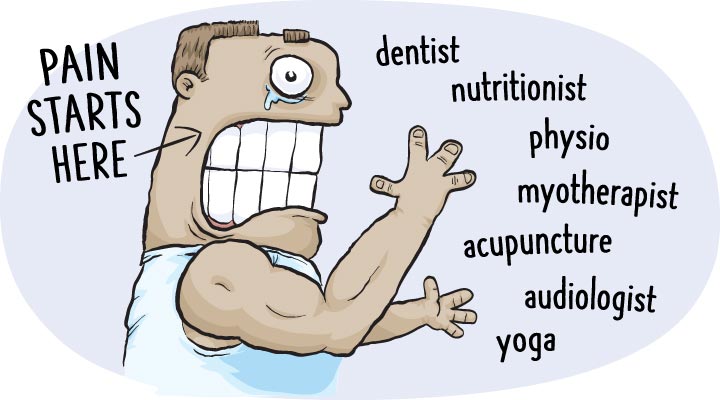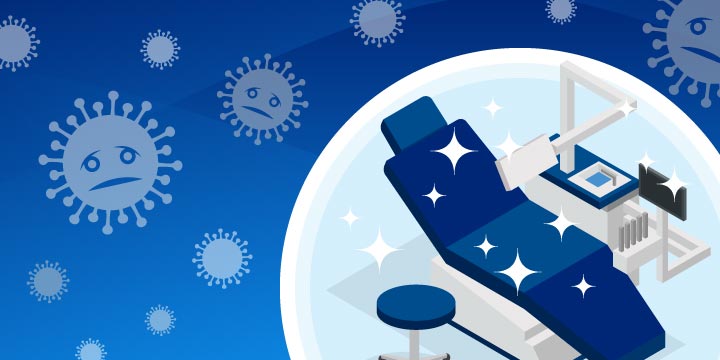Allied health dental approaches – Treating TMJ dysfunction

Have you ever noticed your jaw making a cracking sound? Have you noticed an ongoing pain around your jawline? Have you ever found it hard to chew or drink? Or maybe you’ve been told you grind your teeth during your sleep? Perhaps you’re one of 20-30% of Australians who live with some form of temporomandibular joint (TMJ) dysfunction.
The TMJ connects the jawbone (mandible) to the skull – it’s an essential joint for effective breathing, eating, drinking, speaking and other motions which require the jaw to open and shut. Causes of TMJ dysfunction vary, from degenerative conditions such as arthritis, autoimmune triggers, natural movement (displacement) of discs within the joint over time, trauma to the jaw (as a result of injury), external and internal stress and teeth-grinding (bruxism). So as the causes are so wide and varied, so too are the symptoms and severity. TMJ dysfunction symptoms can be reasonably mild for some people, but for other people it can come across as quite severe and often allowing other medical conditions in the body to develop.
Dentists are often the first professionals many people see when they find out they are living with TMJ dysfunction. If the person presents with mild dysfunction, dentists will often treat and manage dysfunction by using facial injectables, devices such as occlusal splints (sometimes known as bite plates and made of hard or soft transparent acrylic material) or surgery which removes, repositions or reduces the size of some elements within the joint.
Our skilled and caring dentists are very experienced in treating patients with TMJ dysfunction – it is a special interest of Dr Agim Hymer. But, there are other allied health professionals who also treat and manage TMJ dysfunction, and our dentists regularly partner with them for optimal patient outcomes.
TMJ dysfunction is one of many dental and medical presentations by which harnessing the principles and applications of a holistic, integrative approach to patient health and wellness can result in effective and successful management. One of our patients has received immense relief by partnering with the following allied health professionals.
Integrative medical doctor
Our patient sees an integrative medical doctor who blends traditional (Western) medical methods with complementary approaches. The doctor prescribes her daily vitamin and mineral supplements.
Nutritionist
A Nutritionist ensures the optimal levels of key nutrients in our patient’s diet to ensure optimal gut health. There is a lot of reputable peer-reviewed medical evidence to suggest that solid gut health plays an active part in maintaining an overall state of good health.
Physiotherapist
It’s amazing to learn that there are physios who specialise in specific muscle groups and body systems. Some physios specifically treat disorders caused by TMJ dysfunction. Our patient’s TMJ dysfunction stems from an autoimmune cause, which often causes a flareup in her musculoskeletal system. On at least one occasion, she was hospitalised and attended strenuous rehab as she had lost the ability to walk!
Myotherapists and massage therapists
Like the physios, these therapists can hone in on releasing the tension in the TMJ muscles and other muscles experiencing related dysfunction.
Acupuncturists
Therapists incorporating acupuncture techniques (including needling and cupping) help our patient with her stiff joints and stabilise movement.
Yoga
Our patient has attended yoga for many years to improve her breathing techniques. So much so that she has qualified as a yoga teacher! She finds that employing diaphragmatic breathing techniques have dramatically reduced stress, improved movement and also fashioned a healing approach to living with her chronic TMJ dysfunction.
Audiologists
Other patients have come to us with TMD after having seen an audiologist. Audiologists deal with TMD as they see patients with sore or ringing ears. They identify symptoms as coming from TMD and refer the patient to us for further investigation and subsequent treatment.

